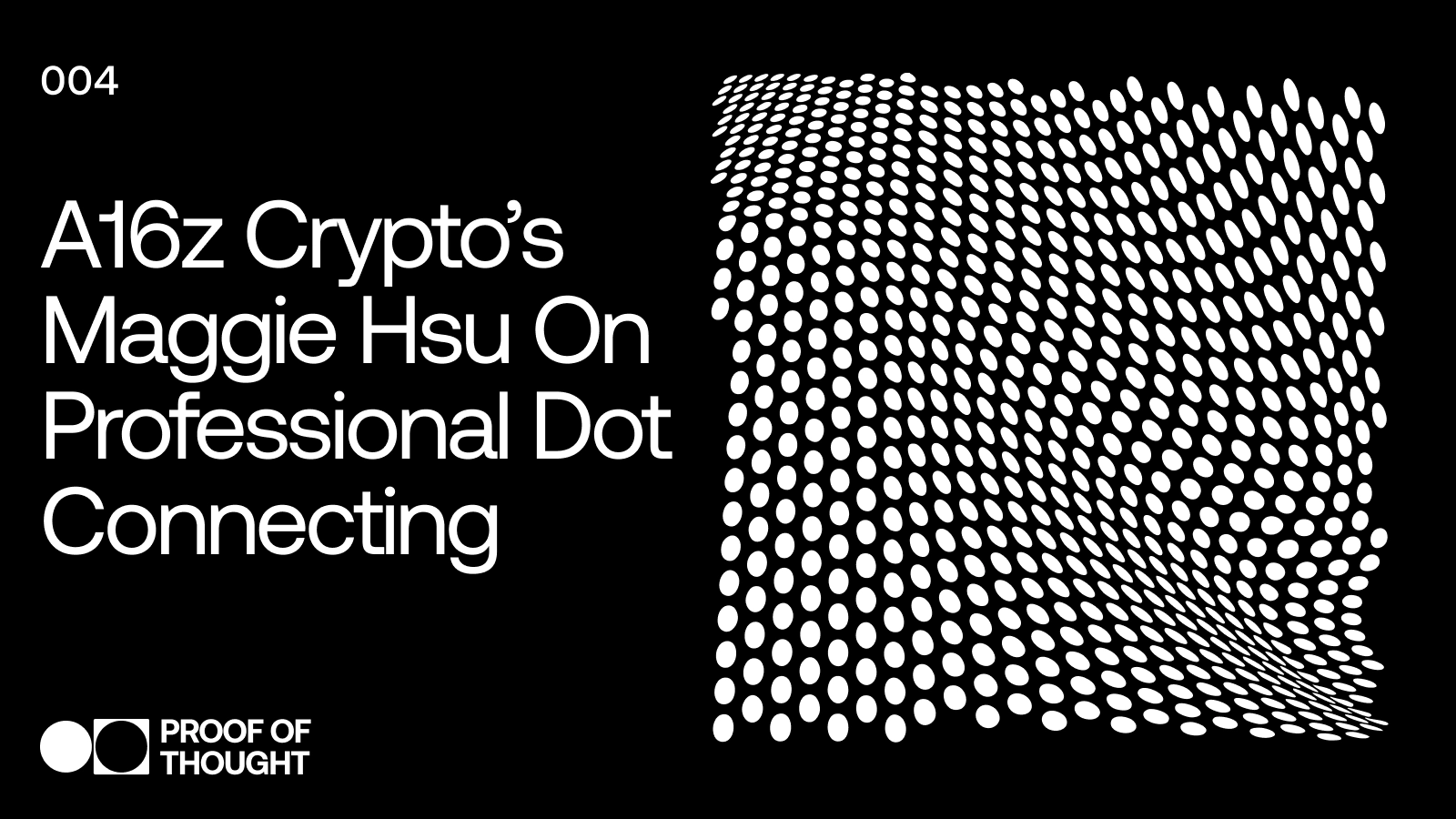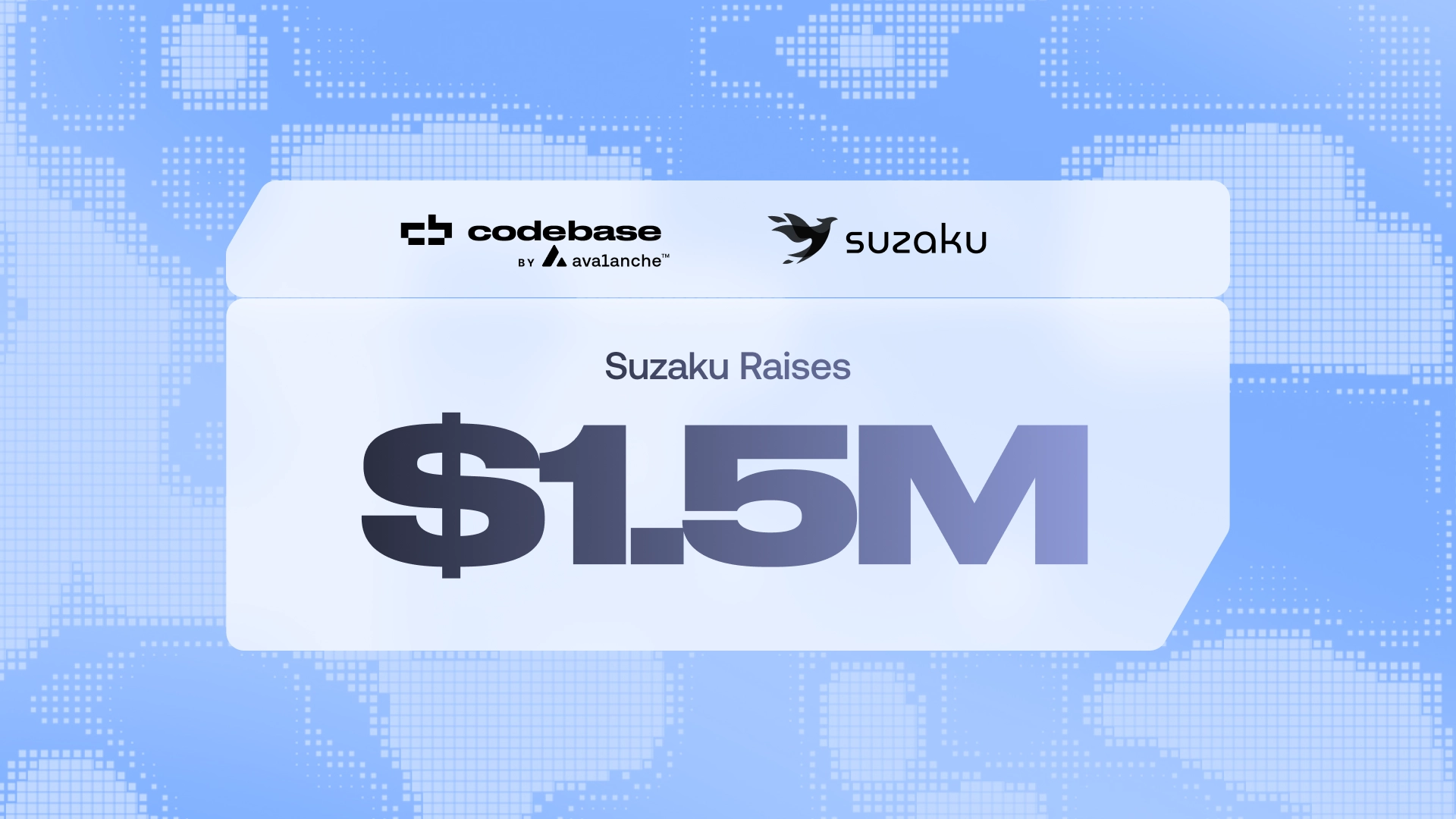Proof of Thought 004: a16z Crypto’s Maggie Hsu on Professional Dot Connecting
Proof of Thought 004: a16z Crypto’s Maggie Hsu on Professional Dot Connecting
Sep 11, 2025 / By Ava Labs / 6 Minute Read

As a leading voice in the industry, what makes Hsu unique is her ability to unite disparate groups and ideas through the notion of “engineered serendipity.” An idea coined by Hsu’s former mentor, the late Tony Hsieh of Zappos, “engineered serendipity” is the ability to curate environments that help people connect with each other in unexpected and catalytic ways.
Welcome to Proof of Thought, a human-centric ideas index pulling Web3 thought leaders out of the hype cycle and into honest dialogue.
Through the exploration of cultural competency, unique mental models and breakthrough thinking, Proof of Thought is a space for ideas worth verifying.
In this installment, we speak with Maggie Hsu, a partner at Andreessen Horowitz, leading go-to-market for the crypto portfolio, and cofounder of Gold House, a nonprofit collective redefining cultural narratives for pioneering Asian leaders.
Hsu comes from a varied background across emerging and established technology, consumer commerce, and hospitality business development, holding positions as an executive and innovative leader often with the common throughline of professional dot connecting.
As a leading voice in the industry, what makes Hsu unique is her ability to unite disparate groups and ideas through the notion of “engineered serendipity.” An idea coined by Hsu’s former mentor, the late Tony Hsieh of Zappos, “engineered serendipity” is the ability to curate environments that help people connect with each other in unexpected and catalytic ways.
From optimizing productivity based on natural rhythms, expanding out of crypto-specific events for optimal idea exchange, and challenging the overuse of the word “ecosystem,” to taking an interest in individual origin stories, Hsu opens the floodgates for new mental models and inspires us to explore new entry points for inclusion, ideation and expansion.
Let’s get into it.

Please share your name, occupation and your why.
Maggie Hsu, Head of Go-to-Market, a16z Crypto. I am a “dot connector,” I’ve always enjoyed connecting the right people at the right time to enable something novel to happen.
Favorite tipping point in tech history?
All of the big shifts I have experienced in my lifetime (the Internet, the iPhone, “the cloud,” social media, AI, etc.) have changed my life meaningfully, but the one that has been the single most impactful from a time perspective has been the rise of the sharing economy with the advent of companies like Uber. Video conferencing changed how we interact globally, but I believe in-person interactions are ultimately the most meaningful. When it comes to the time it takes to get from point A to B, ridesharing has reduced that to a near-frictionless experience and enabled me to have more of those interactions.
What are you saying no to in 2025?
It’s not a hard no, but I’ve been trying to go to fewer crypto conferences and to more conferences in other industries. It’s better to go to a retail or finance conference where you are in the minority and have to argue/influence/change minds around crypto–than to your 10th crypto conference where you see the same people just in a different location.
What’s one buzzword we need to retire?
I use this word all the time so it pains me to say it, but “ecosystem.” It’s like what the word “platform” became–overused to the point where no one knows what it means.
Most obscure life hack?
I don’t think it’s that obscure but it is definitely a key life/productivity hack. I’ve identified the hour of the day when I’m freshest and most clear headed (for me that is around 10-11am) and then I am religious about blocking out that time to do deep work, any critical writing, or projects–rather than filling it with meetings or emails.
What question should people be asking more?
We talk about decentralization a lot, but fewer people ask when is the right time to decentralize (and how best to do it). My colleague Eddy Lazzarin, our CTO, has a great mental model around “progressive decentralization” where he questions “when is the right time to decentralize and how should you do it?” If you decentralize too early it makes it harder to find product market fit.
Who outside of crypto shaped your thinking most?
My former boss, the late Tony Hsieh of Zappos. Tony espoused the notion of “engineered serendipity,” the idea of curating environments that help people connect with each other in unexpected and catalytic ways. Tony putting a mental model around this helped me realize that my “dot connecting” abilities, instead of being a symptom of not being “deep enough” in any one area, was actually one way of spurring innovation and creativity. Some of the biggest breakthroughs come when people in different disciplines share ideas (a quintessential example being the discovery of the double helix structure of DNA–Watson and Crick, two biologists, only figured it out after seeing a photo from Rosalind Franklin, a chemist).
What do you love about Web3/blockchain?
Everyone has such a personal origin story of why they became interested in the space and what resonates with them. Tony also got me into crypto as he was exploring ideas of decentralized governance for Zappos and the Downtown Vegas project, starting with a system called Holacracy.
What do you hate about Web3/blockchain?
Being in crypto can be very all-consuming and I wish we had better support structures for people to take it all in perspective. Over the years I’ve spoken to countless people who want to enter the space, as well as countless people who want to exit the space after being emotionally involved and burned out.
The flip side of a 24/7 economy is that we shouldn’t feel like we have to be connected to work 24/7. There is no end to the conferences or X discourse, so it’s important to take some time to step back and gather perspective.
I appreciate the trend of some conferences morphing into more casual “camps” like FWB Fest, Coinbase’s Basecamp, Solana Summer camp, or Edge City.
What will it take for mainstream crypto adoption?
As Chris says in Read Write Own: "Inside-out technologies arrive nicely packaged, ready for the market. Outside-in technologies arrive messy, mysterious, disguised as something else. Grasping their potential takes work." Crypto is an outside-in technology, so it’s important to study lessons from other outside-in technology, and even though it’s harder to do that way, the rewards are greater. We’re at the stage in crypto where successes won’t be skeuomorphic–we are still finding product-market fit for many crypto use cases.
What’s something most people don't know about you?
When I retire I want to develop and run a boutique hotel (with a blockchain-based loyalty program of course)!
Your Saturday am soundtrack?
Whatever my kids are listening to! Currently a lot of Taylor Swift and KPop Demon Hunters.
Final thoughts
It’s a fun time to be working in the space–with increasing regulatory clarity, we’re seeing actual consumer and institutional adoption, and I’m excited to follow all the launches and product announcements over the next several months!




